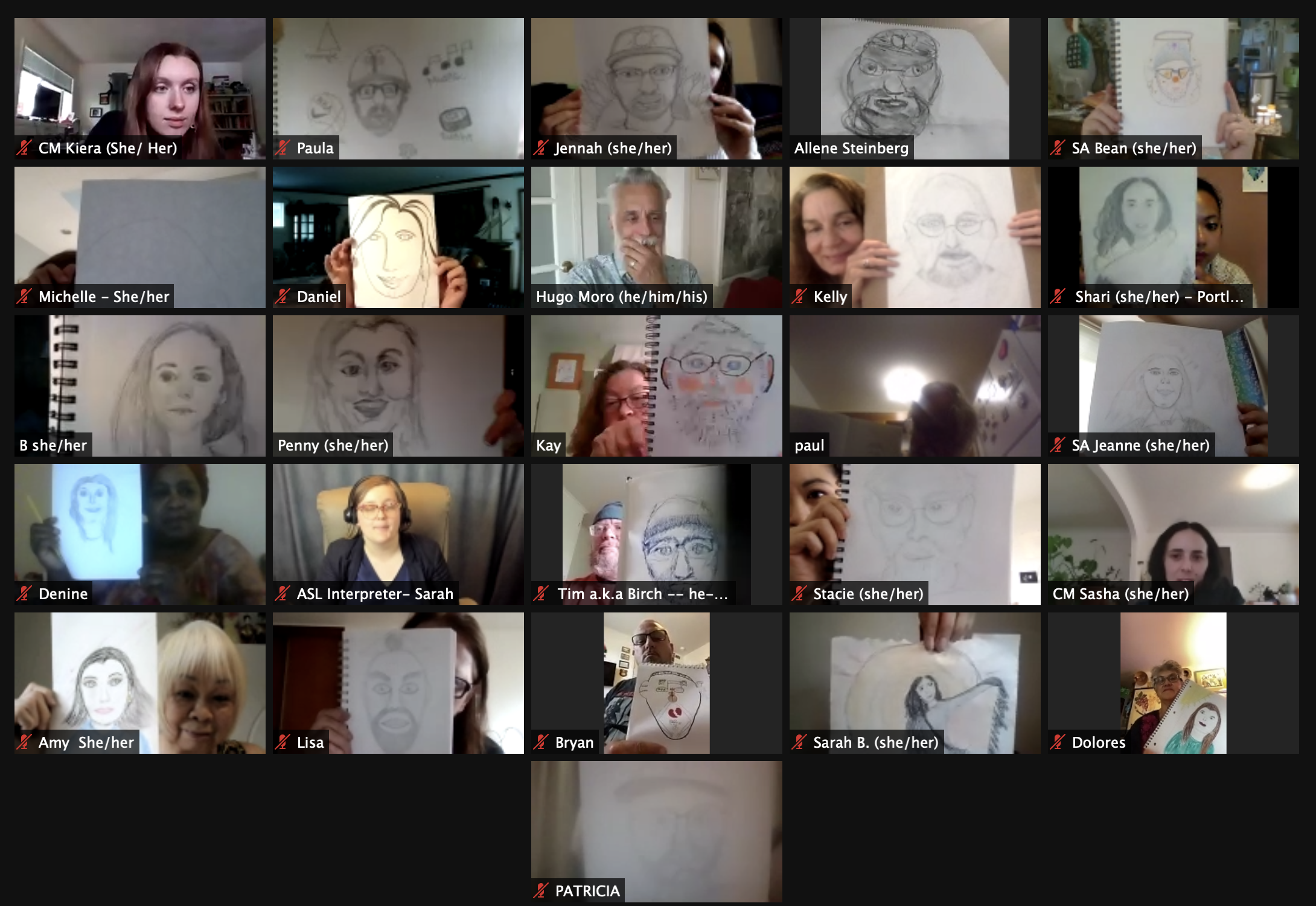Since 2008, PwA has been at the forefront of an international movement that uses the arts to bring dignity, awareness, and healing to the complexity of issues surrounding trauma recovery. We serve low- to no-income adults in active recovery from domestic abuse, homelessness, substance use disorder, mental health challenges, PTSD, and other traumas who are working to rebuild their lives. Creative engagement is a fundamental need of the human spirit, and 93% of Participant Artists report a positive impact on their mental health.
Our Participant Artists are referred to us by over 60 social service partners. These include housing providers such as Plymouth Housing, the YWCA, and the Downtown Emergency Services Center as well as social services, mental health agencies, and veteran organizations such as the Washington Department of Veterans Affairs, Recovery Café, and Veteran Rites.










Participant Artist Stories
Lindsey Packard
The impact of Path with Art goes beyond the individual. In a letter Lindsey wrote, she says, “I am very dedicated to PWA because it makes me feel important and special. I can tell others how much it has helped me. You don’t feel alone, when you are around people that are creative and have similar health problems, you feel more comfortable.”
Path with Art has helped many people deal with depression, health issues, addiction, and other mental health traumas by creating a supportive and inclusive community, Path with Art allows participants to explore their creativity, build confidence, and reconnect with their sense of purpose. The mission of our nonprofit organization is to contribute to a more vibrant and compassionate community by transforming lives through creative expression. Each brushstroke, melody, and word written is a testament to the strength and potential within each person, regardless of their circumstances.
Gary Nelson
I am a singer, songwriter, and poet. I haven’t been able to access that for a long time due to health recovery issues. Due to a spinal surgery, I had to re-learn how to walk and get off my medication. And you guys came at the right time. I wanted to sing again, and there was Path with Art.
I had my counselor at Seattle Housing Authority sign me up for a class, the Sound and Song class with Stewart Zobel, which was a collaborative songwriting class. The experience was wonderful. It was totally different collaborating with so many people.
Going through the pandemic and isolation, the joy of just being able to let it out - to belt it out in community was good for my overall well-being, my mental status. Everyone was there just to express themselves and to be themselves. What we accomplished together, not just made me proud, but want more of it in my life. Having a community and creative outlet for me is spiritually uplifting.
Lynn Armede DeBeal
Multi-disciplinary artist, Lynn Armede DeBeal had always embraced life. Her career started as a specialized glass welder in the semiconductor industry, continued on as an adolescent substance abuse counselor, and ended in finance. Overcoming abuse as a child, Lynn A lived a full, productive life on into adulthood. At the age of 5, Lynn A started to play the violin. Her mom had promised her that she would get her a violin if she mastered the piano. Picking up a guitar at 16, music was a big part of Lynn A’s personal identity. It fed her soul. Having experienced physical abuse at the hands of family members when she was a child and having seen domestic violence as a teen, Lynn A’s music and art provided the opportunity to heal and survive.
Tyler Marcil
Tyler Marcil grew up in a town nestled between New Orleans and Baton Rouge. The oldest of five siblings in a working-class family, they lived within a colorful community of church-going gossips and neighborly get-togethers.
Tyler knew he was different from the age of 6, when he developed a crush on a married man in his community and shamelessly carried out flirtatious prank phone calls. In this same year, he was accosted – classmates violently acted out their dominance and anger over his differences, especially his preference for feminine playthings and the cadence of his speech.
He grew up picking out outfits for his mother to wear to work, and doing her hair and makeup. He moved to LA, where he danced ballet, jazz, and hip-hop. He worked as a hair stylist and makeup artist, and he dreamed of becoming an actor, but he gave up that dream in the 1990s when he was diagnosed with HIV.
Read more about Tyler’s story
Brenda
Brenda started playing piano at age three, and music and storytelling have been her companions ever since. She became a musician and performer, and wanted to help people through music therapy, but her aspirations were set aside when she began grappling with her mental health and fell into illness, unemployment, and homelessness. In a bout of paranoia, she left her home, left everything she knew, and was living on the street. She was hospitalized. She managed to get back into an apartment, but recovery soon became her career.
“It wasn’t until I lost my flute on the street that I realized how sick I was. It was the most precious item in my life. I was out of touch with my family. I felt like I had lost everything. That’s when I started to grasp the reality of my own illness.”






